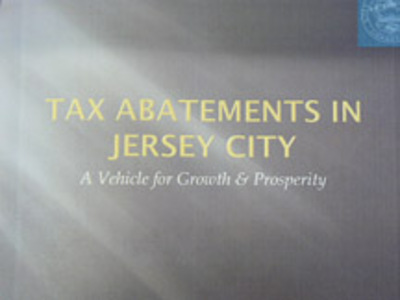Are tax abatement agreements with developers good or bad for Jersey City?
A new report by the New Jersey Policy Perspective, a non-profit public policy think tank based in Trenton, examines that question as it looks at flaws in New Jersey’s long-term tax abatement law and at Jersey City’s use of that law.
The 13-page report, “All That Glitters Isn’t Gold: Property Tax Abatements in Jersey City,” written by Naomi Mueller Bressler of the NJPP and Carolyn Topp, an executive based in “the metro New York area,” outlines the shortcomings of tax abatements granted in Jersey City for development along the city’s waterfront (aka the “Gold Coast”).
The report found the state’s Long-Term Tax Exemption Law of 1991 – which allows New Jersey towns to grant various kinds of property tax exemptions for developments – creates a situation where owners of non-abated properties in Jersey City have to pay property taxes that are distributed between the city, county and school district, while abated properties are excluded from paying school taxes and only pay a fraction of county taxes.
Also, the report echoes what critics have long argued: abatements may not be needed to entice developers to build on Jersey City’s waterfront anymore, since it has become such a desirable area.
According to documents obtained by the Jersey City Reporter, city officials are planning a rebuttal of the claims in the report as well as a PowerPoint presentation on the benefits of Jersey City’s abatement policy. City spokesperson Jennifer Morrill said that a presentation is to be given to the City Council some time in the future. But she did not offer specifics, saying it was still a “work in progress.”
PILOT(s) that do not fly
The problem with abatements is that when developers make annual payments in lieu of taxes (PILOT) to the city, most of the payment go directly to the city budget and 5 percent to the county, rather than being equitably divided among the city, schools, and county.
Cities certainly like these deals because they can use all the money in their budgets, and developers like them because they are saved from the uncertain fluctuations of regular property taxes. But everyday property owners do not like them because it leaves the burdens of school and county taxes on their shoulders.
Developers don’t always get off easy, though. The amount of the PILOT can either be 2 percent of the total cost of the project or about 15 percent of the project’s annual gross revenue, depending on the terms of the agreement. PILOT agreements can extend up to 30 years.
In 2004, the state’s abatement law was amended after a lawsuit from several Hudson County towns claimed they were paying the bulk of county taxes.
The city’s abatement records were “poor and scattered,” the city admits.
________
Reconsidering abatements
The report also cited other problems with the state abatement law and local abatement policy including:
• The public does not have enough time to challenge abatements and is excluded from negotiations between the municipality and developer. (Abatements are ultimately voted on by the City Council.)
• New Jersey law does not limit the number of abatements a municipality can grant or the amount of a municipality’s revenue that can come from them.
• The justification used by governing bodies in awarding tax abatements is often lacking.
• Despite the availability of some abatement-related information online, abatement information in Jersey City is not well maintained or readily available.
• Only a small percentage of the people working on abated projects are Jersey City residents, despite the frequent requirement that abatement recipients make a “good faith effort” to hire city residents.
Recommendations
Among the recommendations in the report were: change the state law to ensure the county and school district receive their fair share of the revenues from abatements; grant abatements for no longer than 10 years; establish a state review of all property tax abatements above a certain value, and make abatement negotiations public.
Looking on the bright side
Jersey City officials have an entirely different view of the report. They have touted for years the positives of abatements, such as spurring development and bringing in revenues needed to plug shortfalls in the city’s operating budget.
The city recently designed a PowerPoint presentation called “Tax Abatements in Jersey City: A Vehicle for Growth & Prosperity,” which cites all the advantages of Jersey City’s tax abatement policy. The presentation notes that the city has given tax exemptions to companies that have built office space and added 22,000 full-time jobs to Jersey City’s workforce in the past 10 years.
In addition, developers receiving abatements also have had to provide funding to the city’s Affordable Housing Trust Fund to subsidize the construction of affordable housing across the city. Developers granted abatements have to pay $1,500 per unit and $1.50 per square foot of commercial space into the fund.
The city also has put together a nine-page report to refute the shortcomings and recommendations given in the NJPP report.
The city said they are currently constructing an electronic abatement database for all such agreements from 1989 to the present to make them more accessible to the public. However, within that rebuttal was the admission of a “potential weakness,” that the city’s abatement records were “poor and scattered” and a “more centralized filing system and better record keeping in general would allow the city to evaluate its program more effectively and address these criticisms at the same time.”
Another rebuttal was offered in response to the NJPP recommendation that developers should only receive 10-year abatements. The city countered that “long term abatements are essential selling tools that help distinguish condominiums in Jersey City from those in competing markets.”
Ricardo Kaulessar can be reached at rkaulessar@hudsonreporter.com.
